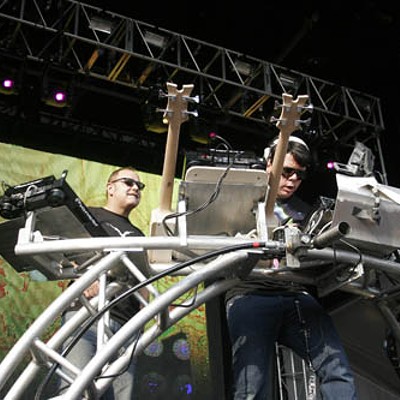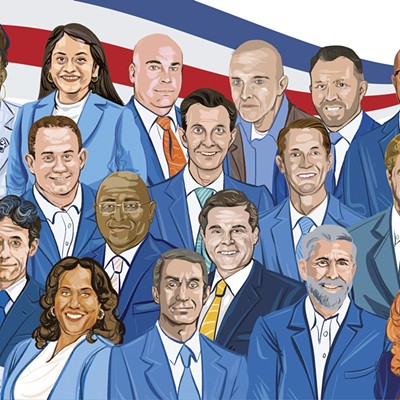Wednesday, August 17, 2011
Citing philosophical differences, foundation, university part ways on Marcellus Shale online project
Pittsburgh's Heinz Endowments is curtailing support of the University of Pittsburgh's Center for Healthy Environments and Communities, one of the key academic centers studying gas-drilling in the Marcellus Shale.
Heinz's support of Fractracker, an on-line resource for following the expansion and potential environmental impact of gas drilling, will continue. But most likely with someone else.
"It's very important for us to maintain Fractracker; it's become a very valuable tool for a lot of groups," says Caren Glotfelty, who presides over the Endowments' environmental initiatives.
In an e-mail to concerned parties, Glotfelty wrote that following a series of recent leadership changes at CHEC, the Endowments reviewed their relationship to the organization. As a result, she wrote, "We have made the decision to reduce the number of tasks currently expected of CHEC with our funding."
Heinz will continue to fund CHEC's research in areas like water quality and risk factors for childhood autism. But the foundation is now looking for a new partner to help maintain Fractracker.
Part of the problem working with Pitt, it seems, is a difference of opinion about when academics should step out of the "ivory tower" and engage with communities directly.
CHEC staffers actively engaged with interested citizens, teaching them how to use Fractracker, and post their own material to it. But in recent months at Pitt, Glotfelty tells City Paper, "It was clear that there is less time and effort going into [Fractracker], particularly on the community outreach side." CHEC is part of Pitt's Graduate School of Public Health, where some academics "feel that CHEC should be more focused on academic research," Glotfelty says. "It seemed pretty clear ... that the advocacy side of this was not in their comfort zone as much as we would like it to be."
Those differences came into clear view with the April departure of CHECS's former director, Conrad Volz, who'd been a high-profile industry critic. University administrators, he told the Tribune-Review, "don't want people to talk about things. They want to do scholarly research and publish it in journals and have it go out into the world."
Volz's interim replacement at CHEC, Bernard Goldstein, acknowledges, "There's no secret that CHEC has raised issues about whether they’d gone beyond where an academic organization is supposed to be."
News that Fractracker would no longer be a project of CHEC was viewed with alarm by some anti-drilling activists. Volz's departure was celebrated by proponents of drilling, who accused him of making over-the-top allegations about drilling's impact. And while Volz has said he left voluntarily, there has been speculation that his departure was a capitulation to the gas industry. In some quarters, such fears were exacerbated by the notice, posted on Fractracker's "About Us" page, that Pitt and Fractracker were also parting ways.
"Until August 2011, the Center for Healthy Environments and Communities (CHEC) was the manager for FracTracker," the notice read. "We are currently transitioning responsibility of FracTracker to one of our community partners."
Glotfelty says she herself was "surprised" by the wording of the announcement. While CHEC staffers did furnish much of the site's content -- and train others to use and add to it -- Glotfelty says the announcement overstates CHEC's role. The software underlying the site, she says, was purchased not for CHEC but for the Foundation for Pennsylvania Watersheds, which hosts Fractracker and maintains control of it.
In any event, Glotfelty says the debate over academia's role in the community predate Volz's departure.
"I think this was an issue from the beginning," she says. While Heinz money was used to establish CHEC, "We may have expected more than we had a right to."
Heinz's role in establishing Fractrackerhas drawn criticism from conservatives. The Commonwealth Foundation, a strident supporter of the natural-gas industry, recently released a "policy brief" blasting Volz and identitying the Endowments as being among "the top foes or obstructionists of an industry that has brought tens of thousands of jobs." The brief cites the creation of Fractracker as proof that "Heinz Endowments is also proactive in its enlistment of allies to exaggerate
the environmental threats of natural gas extraction."
Glotfelty scoffed at that characterization, and the Endowments website prominently links to a Harrisburg Patriot-News story about the brief. While crediting some of the brief's findings, Patriot-News reporter Donald Gilliland argues that Commonwealth "over-reaches, however, when it paints Heinz Foundation funding of university baseline studies as anti-gas."
At any rate, Goldstein says Pitt staff will likely continue to furnish content for Fractracker. Future dispatches might include, for example, recaps of material presented at a Pitt conference on drilling's impact this November.
Goldstein says faculty shouldn't be barred from engaging with hot-button issues. (In fact, Goldstein himself authored an op-ed calling for a drilling moratorium in today's Post-Gazette.) But he says academic priorities must remain paramount -- including the need to publish in peer-reviewed journals.
"When academia tries to work with communities, it often overpromises," Goldstein says. "So you end up in a situation where [Volz] was working 80 hours a day." Goldstein says part of his goal as interim director was to "improve the strength of the academic aspects of CHEC."
"Developing a program like Fractracker is appropriate for an academic institution," Goldstein adds. "[But] I've always argued that our responsibility to act as faculty -- beyond publishing things in a peer-reviewed journal -- is related to whether there are other organizations that can effectively do the action. There may now be people better able to keep and maintain Fractracker now that it's going."
CHEC itself has been going through a period of transition since Volz's departure. Charles Christen, CHEC's director of operations, subsequently left to head the Pittsburgh AIDS Task Force. Goldstein himself is also stepping down as interim head of the cener.
Those departures appear unconnected to controversies over gas drilling: By all accounts, the AIDS Task Force was Christen's dream job. (He's already been replaced by a new administrator, Jill Kriesky.) Goldstein, meanwhile, is leaving the interim post to focus on codifying principles of environmental "sustainability," so that they may become the basis for potential future potential environmental regulations
Glotfelty says Fractracker may even be reunited with CHEC, depending on who becomes the center's next director. "They may hire someoe whose perspective is what we would hope to get," she says.
In the meantime, though, all the changes have required some adjustment for people like Samantha Malone ... and not just because Fractracker was at the heart of her doctoral work.
"So much is in the air right now," says Malone, a communications specialist at CHEC who has frequently authored Fractracker content.
Whoever adopts the system, Malone says, will be on a steep learning curve. "It's a very intricate system." The Heinz Endowments aren't disclosing who the potential Fractracker partners may be; while Malone says another academic partner could boost the site's stature, "People in the advocacy arena are most interested in it. Members of GASP [the Group Against Smog and Pollution] have been trained in it."
In the meantime, she's getting an education in just how tricky it can be to negotiate between academia and the outset world.
"We're funded from a philanthropic organization with very specific goals, and we’re affiliated with a university" with its own academic agenda. Having a foot in both camps, Malone says, "is a strength, but it feels like a bit of split-personality sometimes. We're learning early on that this is going to be a challenge throughout our careers."
Tags: Slag Heap











